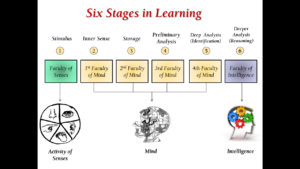
The Six Stages of Learning in Vedic Psychology: Integrating the Faculties of Senses, Mind, and Intelligence

The Six Stages of Learning in Vedic Psychology: Integrating the Faculties of Senses, Mind, and Intelligence
Introduction:
In Vedic psychology, the process of learning is not only a cognitive endeavor but also a holistic journey that engages the faculties of senses, mind, and intelligence. The six stages of learning, when viewed through this lens, provide a comprehensive framework for understanding how individuals assimilate knowledge, analyze information, and attain deeper insights. In this exploration, we elucidate each stage of learning within the context of the faculties of senses, mind, and intelligence, shedding light on their interplay and significance in the pursuit of wisdom and self-realization.
1.Stimulus (Indriyas):
The journey of learning begins with the stage of Stimulus, where individuals engage their faculties of senses (Indriyas) to perceive the external world. Through sight, hearing, touch, taste, and smell, they receive sensory inputs from their environment, initiating the process of cognition and awareness. Stimulus serves as the gateway through which individuals interact with the external world, gathering raw data and sensory impressions that form the basis of their learning experience.
2.Inner Sense (Manas):
Following the stage of Stimulus, learners enter the realm of Inner Sense, where the faculty of mind (Manas) processes and organizes the sensory information received from the external world. Through the faculty of inner sense, individuals create mental representations and impressions of their perceptions, forming the basis for cognition, memory, and thought. Inner Sense enables individuals to make sense of their sensory experiences and construct meaning from the diverse stimuli encountered in their environment.
3.Storage (Chitta):
As individuals navigate the complexities of their sensory experiences, the faculty of intelligence (Buddhi) comes into play, facilitating the stage of Storage. In this phase, sensory impressions and mental representations are stored and encoded in the faculty of memory (Chitta), forming a repository of knowledge and information. Through the process of storage, individuals retain and recall past experiences, insights, and learning, shaping their understanding of the world and themselves.
4.Preliminary Analysis (Buddhi):
Building upon the foundation of Storage, learners engage their faculty of intelligence (Buddhi) in the stage of Preliminary Analysis. In this phase, individuals apply critical thinking and reasoning skills to evaluate and interpret the stored information, discerning patterns, connections, and relationships. Preliminary Analysis involves synthesizing disparate data points and forming initial hypotheses or interpretations, laying the groundwork for deeper inquiry and understanding.
5.Deep Analysis (Identification) (Buddhi):
As individuals delve deeper into the process of learning, they transition to the stage of Deep Analysis (Identification), where the faculty of intelligence (Buddhi) plays a central role in discerning underlying patterns and principles. In this phase, individuals engage in focused inquiry and investigation, identifying key insights, themes, and concepts that emerge from their preliminary analysis. Deep Analysis (Identification) involves recognizing the significance and relevance of specific information, laying the groundwork for deeper exploration and understanding.
6.Analysis (Reasoning) (Buddhi):
At the pinnacle of the learning journey lies the stage of Deeper Analysis (Reasoning), where individuals harness the full power of their faculty of intelligence (Buddhi) to engage in rigorous reasoning and critical inquiry. In this phase, individuals employ logic, inference, and deduction to explore the underlying principles and implications of the knowledge they have acquired. Deeper Analysis (Reasoning) involves synthesizing disparate pieces of information, discerning causal relationships, and arriving at deeper insights and conclusions.
Conclusion:
The six stages of learning in Vedic psychology, when viewed through the lens of the faculties of senses, mind, and intelligence, offer a comprehensive framework for understanding the cognitive processes involved in knowledge acquisition and understanding. Through the interplay of sensory perception, mental representation, and intellectual analysis, individuals embark on a transformative journey of self-discovery and inner awakening, culminating in the attainment of wisdom and self-realization.
References
- Taimni, I. K. (1961). The Science of Yoga. The Theosophical Publishing House.
- Feuerstein, Georg. (1996). The Yoga Tradition: Its History, Literature, Philosophy, and Practice. Hohm Press.
- Satyananda Saraswati, Swami. (1976). Meditations from the Tantras. Bihar School of Yoga.
- Vivekananda, Swami. (1896). Raja Yoga. Advaita Ashrama.
- Shankaracharya, Adi. (8th century CE). Vivekachudamani. Self-Realization Fellowship.
- Saraswati, Swami Satyananda. (1969). Sure Ways to Self-Realization. Bihar School of Yoga.